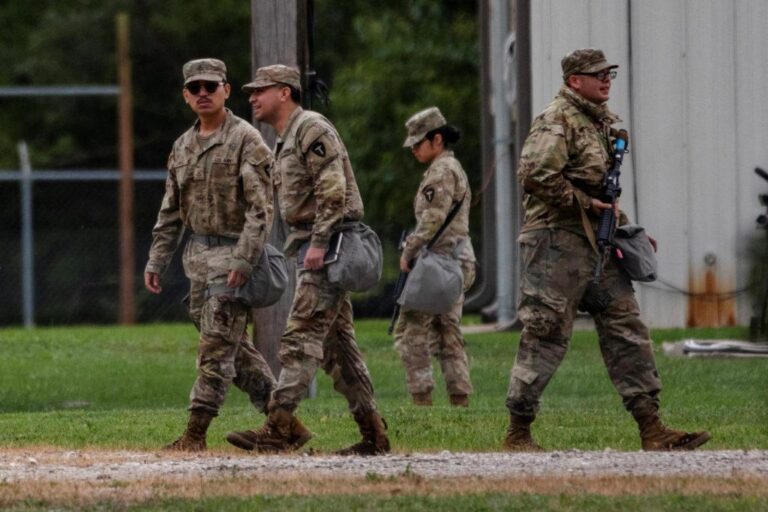Retired Generals Caution Against Military Deployment in Chicago
A group of retired military generals has raised serious concerns about the proposal to send federal troops into Chicago to combat rising violence. Drawing on their extensive military backgrounds, these leaders warn that introducing armed forces into civilian neighborhoods risks escalating tensions and undermining community trust. They emphasize that sustainable crime reduction should focus on addressing underlying social issues rather than relying on a militarized presence.
Main concerns highlighted by these former generals include:
- Potential breakdown of trust between residents and law enforcement agencies.
- Blurring of responsibilities between military personnel and police,complicating oversight.
- The necessity of prioritizing conflict de-escalation over forceful interventions.
- Long-term threats to civil rights and freedoms.
| Issue | Possible Consequence |
|---|---|
| Militarization | Heightened fear and unrest within communities |
| Accountability | Ambiguity in legal jurisdiction and duty |
| Civil Liberties | Diminished protections for everyday freedoms |
How Military Presence Could Affect Community Relations
Introducing troops into urban areas like Chicago could deepen existing divides between law enforcement and local populations. Retired generals warn that a military footprint may be perceived as an aggressive tactic rather than a protective measure, especially in neighborhoods already grappling with economic hardship and historical mistrust. This perception risks alienating residents who favor community-driven approaches to safety.
Experts identify several potential drawbacks of deploying troops, such as:
- Increased likelihood of violent clashes due to lack of familiarity with local social dynamics.
- Decreased collaboration between community leaders and law enforcement.
- Damage to Chicago’s reputation as a welcoming city for business and tourism.
These military veterans advocate for channeling resources into social initiatives and police reforms that encourage dialog and trust-building, emphasizing that true security stems from within the community rather than external enforcement.
| Potential Effect | Clarification |
|---|---|
| Distrust Among Residents | Growing skepticism toward authorities, hindering cooperation |
| Escalation of Violence | Risk of confrontations intensifying into serious conflicts |
| Economic Impact | Decline in local commerce and property values due to instability |
Experts Recommend Community-Centered Crime Reduction Strategies
Security specialists and former military officials alike argue that deploying troops risks alienating communities and escalating tensions. Instead, they advocate for community-focused interventions that tackle root causes such as poverty, education gaps, and mental health challenges. These approaches aim to strengthen cooperation between citizens and law enforcement while safeguarding civil liberties.
Suggested alternative strategies include:
- Boosting investment in youth mentorship and outreach programs to deter gang involvement.
- Expanding mental health crisis response teams integrated with police efforts.
- Enhancing social support systems to address housing insecurity and employment obstacles.
- Implementing transparent, data-driven policing methods to rebuild public trust.
| Initiative | Focus | Anticipated Result |
|---|---|---|
| Youth Mentorship | Prevention | Lower rates of gang recruitment |
| Mental Health Teams | Crisis Intervention | Safer handling of at-risk individuals |
| Social Services | Support Systems | Mitigation of systemic instability |
Prioritizing Local Law Enforcement and Social Initiatives
Experts emphasize that effectively tackling Chicago’s violence requires empowering local police forces through enhanced training, increased funding, and the adoption of modern technology. Community policing models that foster ongoing engagement and transparency are seen as vital to rebuilding trust between officers and residents.Introducing military personnel, they argue, risks inflaming tensions rather than resolving them.
Alongside law enforcement improvements, expanding social programs is critical to addressing the root causes of crime.Investments in education, job training, and mental health services are essential to stabilizing vulnerable neighborhoods over the long term. Key focus areas recommended by specialists include:
- Modernizing police operations: Incorporating body cameras, data analytics, and community liaison teams.
- Youth progress: Offering after-school activities and career mentorship.
- Mental health resources: Establishing crisis intervention units and accessible counseling.
- Economic empowerment: Providing job placement services and small business support.
| Program | Expected Impact | Projected Timeline |
|---|---|---|
| Community Policing Expansion | Improved public trust and increased crime reporting | 6-12 months |
| Youth Employment Initiatives | Decrease in youth-related offenses | 12-18 months |
| Mental Health Crisis Teams | Enhanced emergency response and reduced incarceration rates | 3-6 months |
| Economic Development Grants | Strengthened community stability and growth | 6-9 months |
Conclusion: Balancing Safety and Civil Rights in Chicago
As discussions continue on how best to improve public safety in Chicago, the insights from retired generals add a crucial outlook. Their expert advice warns against the risks of militarized interventions in urban settings and encourages policymakers to explore community-driven solutions that build trust and cooperation. This ongoing dialogue highlights the necessity of carefully crafted strategies that protect both security and civil liberties in America’s third-largest city.





